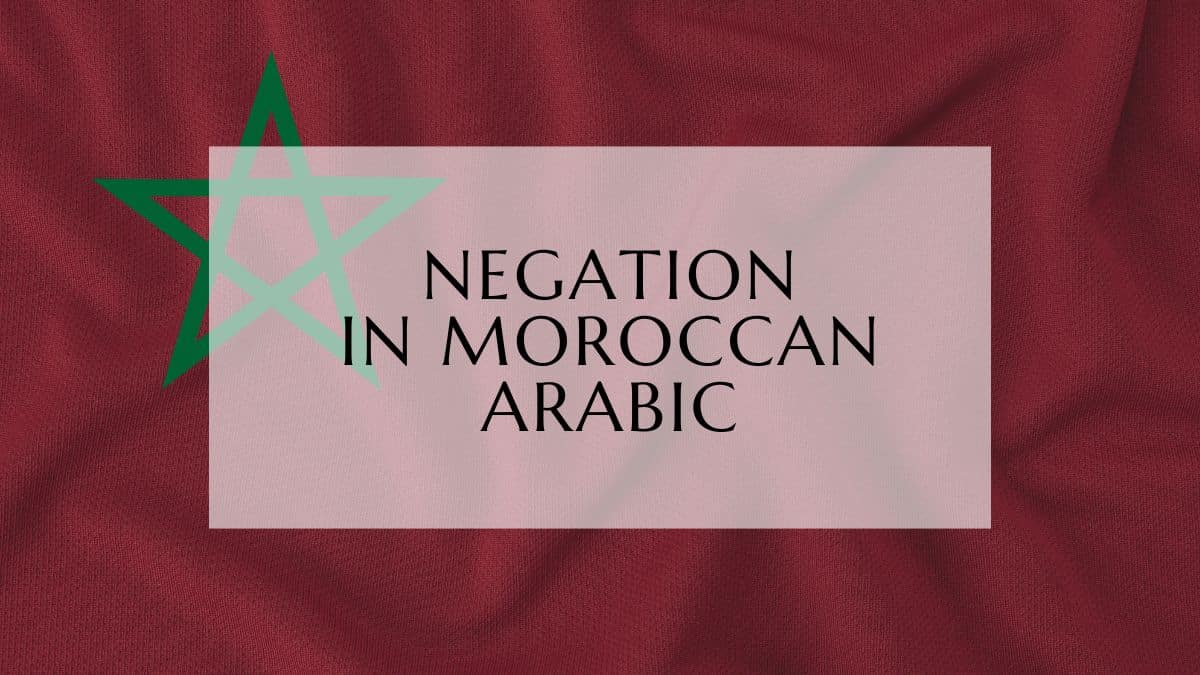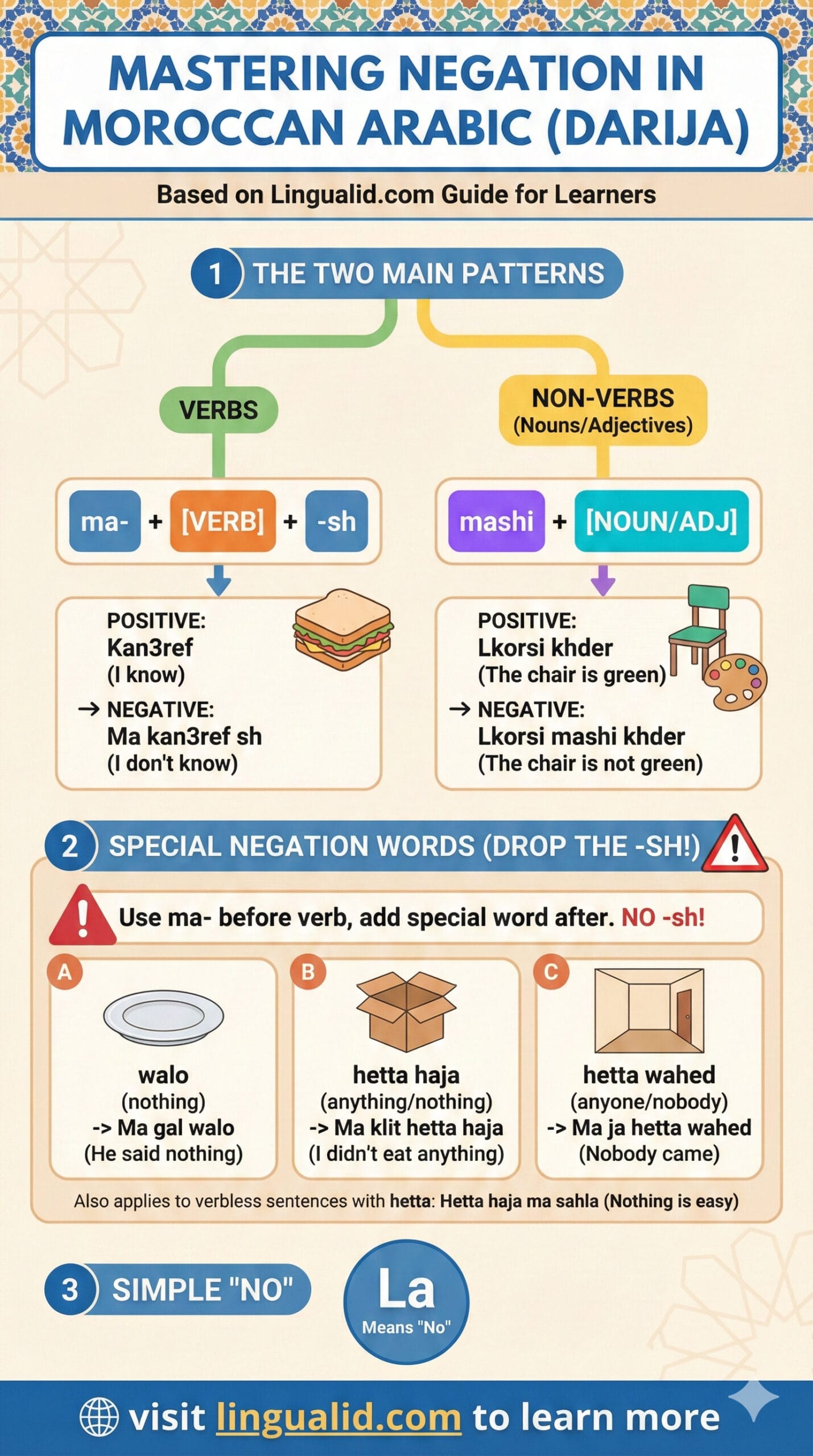In today’s lesson, we will talk about negation in Moroccan Arabic, and how to express it, followed by several examples to understand it well.
To express negation in Moroccan Arabic, Moroccans use two negative markers, one before the verb (ma-) and one after the verb (-sh).

Negation In Moroccan Arabic
Mashi the word of negation
Mashi is pretty much like the English Not, see how these sentences are negated:
- Wash lkorsi khder? / واش الكرسي خضر؟ (Is the chair green?)
Ng: La mashi khder / لا ماشي خضر (no it’s not green)
This is how to negate simple sentences that don’t contain verbs (or any of the words that we will discuss later on in this post), what if you wanted to express negation with verbs?:
- Wash nta lli ktbti hada? / واش نتا اللي كتبتي هدا؟ (is it you who wrote this?)
Ng: Mashi ana lli ktbt hada, Oualid / ماشي أنا اللي كتبت هدا، وليد (it’s not me who wrote this, Oualid -did-)
NB: as the previous sentence contains lli (who/which) negation will still happen with the mashi, and if you would like to negate the verb itself, without lli or hetta (which we will explain shortly) negation will require this form ma-verb-sh:
- Wash kat3ref Lingualid? / واش كتعرف لينگوليد؟ (do you know Lingualid?)
Wah kan3ref (yes I know) now the negation lol:
Ng: La makan3refsh / لا مكنعرفش (no I don’t know)
NB: this form could be used with simple sentences that contain adjectives too, so “lkorsi mashi khder” could also be said: “lkorsi makhdersh“. use what you think is easy for you.
Note: you can practice what you’ve learned here, and learn how to pronounce each of the words in our Memrise course here, don’t know how to use the platform or sign up? we’ve got you covered in this easy-to-follow tutorial here.
Negation in Verbal Sentences With Hetta
Hetta (literally means: even) words are words like Hetta haja /حتى حاجة (anything/nothing) hettawahed / حتى واحد (anyone/nobody) and hetta by itself means (even), take a look at these sentences:
Mamsha hetta wahed lelmedrasa : Nobedy went to the school (ما مشى حتى واحد)
Hetta model ma3jebni / حتى موديل ماعجبني (I didn’t like any model)

Negation in Verbless Sentences With Hetta
In this case, we only add ma at the beginning of the verb ( no -sh is needed here):
- Wash kayna shi haja sahla f ddenya? / واش شي حاجة سهلة فالدنيا (is there anything easy in life?)
- Ng: Hetta haja masahla : nothing is easy (حتى حاجة ما سهلة)
Hetta model ma3jebni / حتى موديل ماعجبني (I didn’t like any model)
Walo (nothing) follows the same rules Hetta does:
Ahmed magal walo / أحمد ماقال والو (Ahmed didn’t say anything)
Moroccan Arabic Negation Study Guide
Quiz
- What are the two negative markers in Moroccan Arabic, and where do they appear in relation to the verb?
- How would you negate the sentence “The chair is green” in Moroccan Arabic?
- Explain how the word “lli” affects negation in a sentence.
- Translate the following sentence into English: “La makan3refsh.”
- Provide the Moroccan Arabic negation of the sentence: “Do you know Lingualid?”
- What is the literal meaning of the word “Hetta,” and in what types of sentences is it used for negation?
- Translate the sentence “Ma msha hetta wahed lelmedrasa” into English.
- How is negation formed in verbless sentences using “Hetta”? Give an example.
- What is the function of the word “Walo” in negation, and how is it used?
- Give an example of a Moroccan Arabic sentence using “Walo” for negation.
Answer Key
- The two negative markers are “ma-” and “-sh.” “Ma-” appears before the verb, and “-sh” appears after the verb.
- “Lkorsi mashi khder” or “Lkorsi ma khder sh.”
- “Lli” (who/which) requires the use of “mashi” for negation, even if the sentence contains a verb. For example, “It’s not me who wrote this” would be “Mashi ana lli ktbt hada.”
- “No, I don’t know.”
- “Wash ma kat3refsh Lingualid?”
- “Hetta” literally means “even.” It is used for negation in sentences expressing “anything/nothing” or “anyone/nobody” using words like “Hetta haja” (anything/nothing) or “Hettawahed” (anyone/nobody).
- “Nobody went to school.”
- In verbless sentences using “Hetta,” only “ma” is added before the verb. For example, “Nothing is easy” would be “Hetta haja masahla.”
- “Walo” functions similarly to “Hetta” and means “nothing.” It is used to negate sentences by placing it after the negated verb with “ma.”
- “Ahmed magal walo” (Ahmed didn’t say anything).
Happy learning!
Oualid Cheddadi is the founder of Lingualid, a platform that inspires independent language learners worldwide, regardless of the language they are learning. The name “Lingualid” is derived from the Portuguese word for “language,” “língua,” and the last three letters of Oualid’s name, “Lid.”




